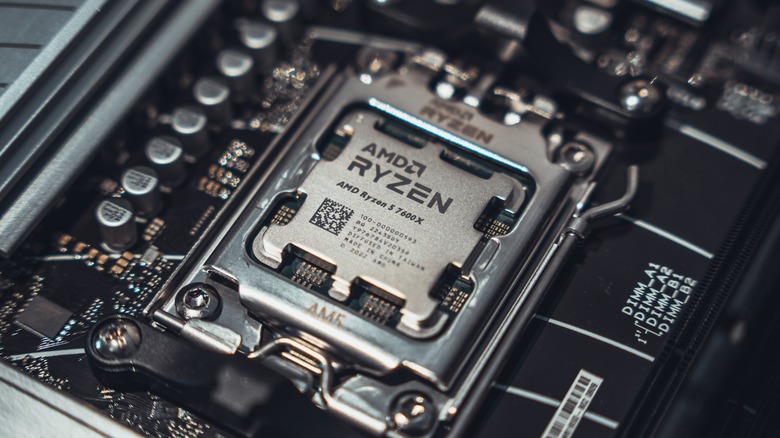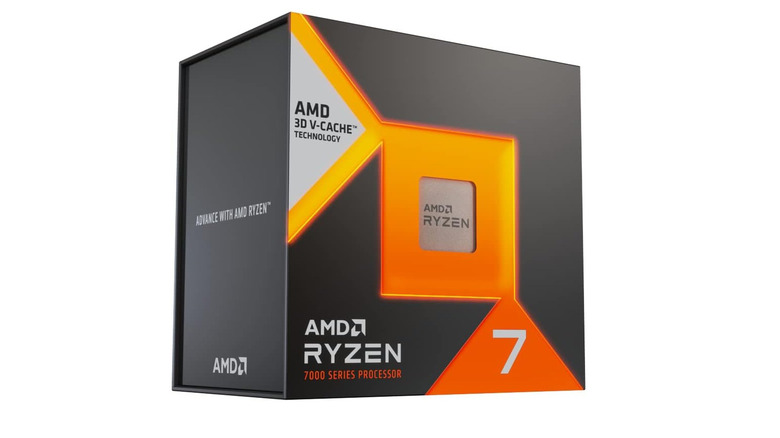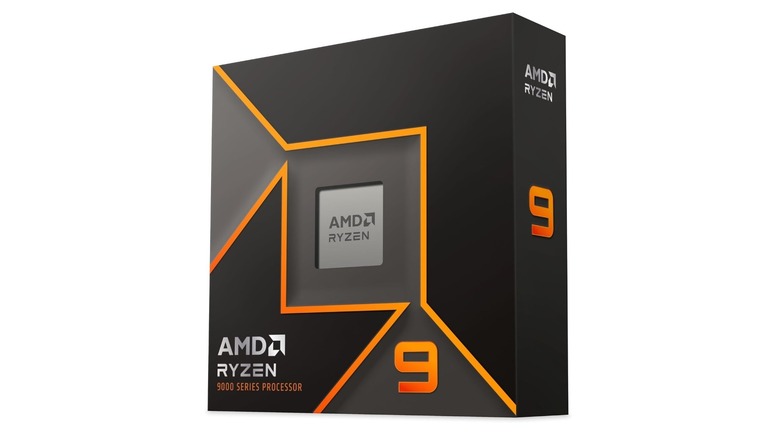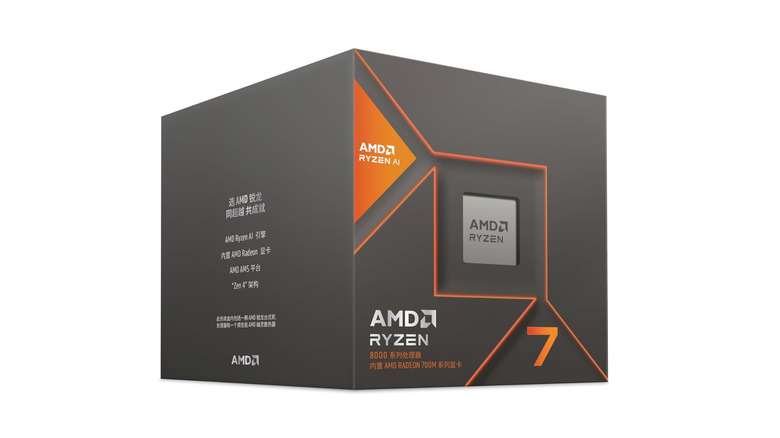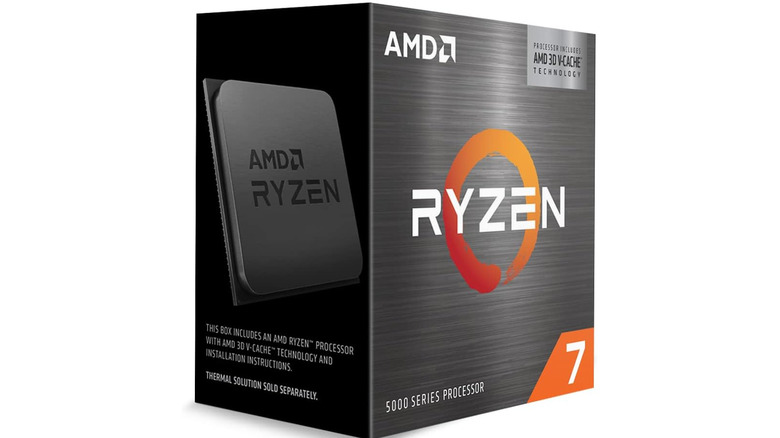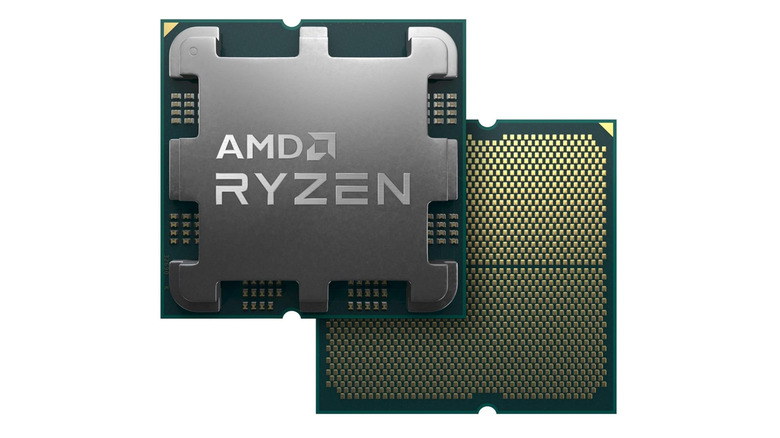5 Of The Best AMD CPUs For PC Gaming In 2024
We may receive a commission on purchases made from links.
Picking the right gaming CPU can be tricky, but if you've made up your mind to give AMD a try, you're already on the right track. In the last few years, AMD has dominated the gaming CPU scene, largely thanks to its innovative 3D V-Cache. This technology massively boosts the amount of L3 cache on the processor, which, as it turns out, plays a huge part in gaming performance. Still, even AMD's non-3D CPUs are solid picks for gaming purposes.
I've been writing about and reviewing PC hardware for over five years, and I built my first PC nearly 20 years ago, so I've seen the way AMD has become the go-to for gamers. In fact, the shift in the narrative of Intel vs. AMD has been palpable. While Intel still makes some outstanding processors, many gamers now turn to AMD as a budget-friendly choice that can deliver great performance.
The best gaming CPU right now is, by far, the Ryzen 7 7800X3D, but I'll also introduce you to a few other picks that are worth considering for your next PC build. I picked these based on my experience in the world of PC hardware as well as opinions from other reviewers.
The best gaming CPU: Ryzen 7 7800X3D
The Ryzen 7 7800X3D is the best gaming processor in 2024, and it will most likely remain so until the Ryzen 7 9800X3D becomes widely available. This is an eight-core, 16-thread CPU that delivers a base clock speed of 4.2 GHz and a maximum boost frequency of 5 GHz. However, as I mentioned above, the best thing about it is the 3D V-Cache.
Thanks to vertically stacking extra cache, AMD was able to give the 7800X3D a whopping 96MB of L3 cache. This is why an eight-core CPU — which is a fairly conservative number of cores — can breeze through games like no other processor. I'm not trying to sound sales-y here, by the way. I own this CPU and can confirm that it's nothing short of a gaming beast.
More L3 cache, stacked the way AMD does, means that more data can be stored closer to the CPU. This makes data retrieval much faster, lowers latency, and can deliver more consistent frame rates in games.
Benchmarks consistently show the Ryzen 7 7800X3D beating much pricier CPUs in gaming scenarios. It wipes the floor with the current-gen Ryzen 9 9950X but also the last-gen Intel Core i9-14900KS. Both of those processors cost a great deal more than the Ryzen 7 7800X3D.
The weakness of this CPU lies in its productivity potential. It's a gaming processor through and through, so if you're planning to build a balanced rig for both work and gameplay, you might be better off choosing something else. It's not always available on Amazon these days as demand is consistently high and the next generation is on the horizon, but if you can snag it, then go for it for a pure gaming build.
The best gaming CPU for productivity: Ryzen 9 9950X
AMD's Ryzen 9 9950X is the flagship CPU in the Zen 5 lineup, and it's the answer to your problem if you're not satisfied with a pure gaming CPU. For those of us who combine work and gameplay on a single PC, the Ryzen 9 9950X will do the trick — although, as you may have noticed, it lacks the 3D moniker that indicates an abundance of L3 cache. This is why I recommend the 9950X only if you're looking for the best of the best overall and not necessarily for a strict gaming build.
The Ryzen 9 9950X sports 16 cores, 32 threads, and a maximum boost clock speed of 5.7GHz. The combined cache sits at 80MB, 64MB of which is the L3 cache. This makes it a less optimal option for just gaming, and it shows. Various benchmarks show that the 9950X cannot beat the 7800X3D in gaming scenarios. In fact, AMD itself admitted as much prior to its launch. However, the difference is slim enough that you won't notice it.
In productivity, the 9950X takes a massive lead. If you use your PC for resource-heavy workloads such as video editing or AI, you'll love the off-the-charts multi-core performance. But if you're like me and just have a hundred tabs open at a time alongside your favorite game, then don't worry — the 7800X3D can handle that.
The Ryzen 9 9950X is expensive, having launched at a recommended list price (MSRP) of $649. Fortunately, you can also buy the Ryzen 9 7950X for much less, and the two CPUs aren't far apart in performance. There's also the Ryzen 9 9900X that pushes the price down even further. Check out our CPU buying tips to make sure you pick the right one.
The best gaming CPU with integrated graphics: Ryzen 7 8700G
If you're a gamer on a tight budget, or you tend to play indies and other non-demanding titles, here's an alternative: Why not just skip the graphics card entirely? The Ryzen 7 8700G is a fairly new accelerated processing unit (APU) that combines the CPU and the GPU in a single chip, so it could be the answer to what you're looking for.
As far as specs go, the 8700G is your standard eight-core, 16-thread processor with a much more conservative TDP of 65 watts. The frequency can be boosted up to 5.1GHz. As a processor, it's good enough, but it's the combination of CPU and GPU that gives it some merit in budget builds. There's a built-in RDNA 3 graphics card on the same chip, the Radeon 700M, which gives it a lot more oomph in gaming than a standard integrated graphics card.
Reviewers tend to agree that the 8700G is adequate for 1080p gaming and solid for 720p. Most people with a desktop play at 1080p, but if you're ready to tweak some settings and stick to non-demanding games, it'll do the job. Moreover, you can boost your rig with an affordable graphics card later down the line and let the 8700G function as a CPU and nothing else.
Will it give you groundbreaking gaming performance? No, but it's cheaper than buying a separate desktop CPU and discrete graphics card, and for some people, it'll certainly suffice. You can buy it on Amazon, and you'll also find cheaper alternatives like the Ryzen 5 8600G for nearly half the price.
The best budget gaming CPU: Ryzen 5 5700X3D
We're back to the 3D V-Cache with the Ryzen 7 5700X3D. Although this processor belongs to AMD's last-last gen Zen 3 lineup, it's still a powerful contender in the gaming CPU market. I'm going to sound like a broken record here and say: Yeah, it is all thanks to the 3D V-Cache.
The Ryzen 7 5700X3D was released a lot later than most of the Zen 3 processors, only hitting the shelves in early 2024. It comes with eight cores, 16 threads, a TDP of 105 watts, and a base clock of 3GHz that can be boosted up to 4.1 GHz.
In terms of performance, it's a surprisingly solid processor, and you'll find it paired with some of the best graphics cards. Much like most of the 3D V-Cache CPUs, it's not ideal for productivity and multi-core performance, but it can put out some serious frame rates. It falls within 10% of the (much pricier) 5800X3D.
If you want a middle ground between the pricey and difficult-to-get Ryzen 7 7800X3D and a jack-of-all-trades type of CPU, the Ryzen 7 5700X3D should be your pick. Just a few months prior, I'd have told you to get the 5800X3D instead, but the 5700X3D is so ridiculously cheap that it's pulling ahead. If you can spot the 5800X3D at a similar price, go for that one.
The best value gaming CPU: Ryzen 5 7600
As far as value goes, the Ryzen 5 7600 is easily the best AMD processor right now. It's not the most powerful CPU, but it can handle gaming workloads just fine. It's an affordable entry into PC gaming, and since many games rely on the graphics card more than they do on the processor, you might not even notice that you're running a budget CPU.
The Ryzen 5 7600 comes with six cores and 12 threads, a modest TDP of 65 watts, and a maximum clock speed of 5.1 GHz. Some benchmarks show it as on par with the Ryzen 7 5800X3D, although arguably, the Zen 3 chip should usually pull ahead in gaming. Still, you'll find the 7600 beating the likes of the 5950X at times. It's a solid CPU.
For some, the six cores might be a deterrent. It's true that the Ryzen 5 7600 can't compete in multi-tasking, but it'll do the job for a gaming computer. If you want to run lots of different things at once, the six cores might become limiting at one point. That's pretty much the only downside of this midrange processor, though, and the fact that you can pick it up for under $200 is a huge perk.
